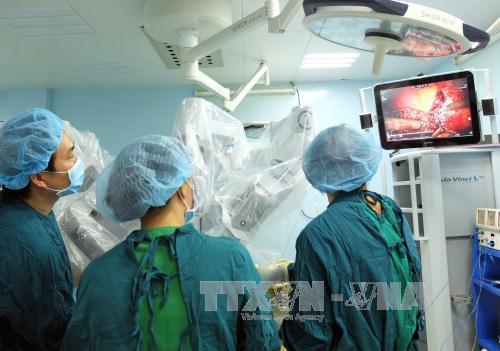Vietnam first carries out robotic surgery for liver cancer
Doctors at Binh Dan Hospital in Ho Chi Minh City have successfully performed a robotic surgery for patients with liver cancer. This is the first robotic surgery for liver cancer conducted in Vietnam.

Doctors performing robotic surgery for patient with liver cancer
Mr C.M.T (59 years old) was found to have a tumor in the left liver during a regular health checkups.
“For non-metastatic liver cancer, radical surgery is the most effective treatment. After discussing with the patient's family, doctors decided to choose a robotic surgery to both fully cut the cancerous liver lobes and minimize the risk of damage to liver blood vessel"said Dr. Vo Van Hung, Deputy Head of Dept. of Hepatology, Binh Dan Hospital.
On July 27th, the operation was successfully carried out, completely cut the lower lobes II, III of liver.
The use of a robot also helps to reduce pain, bleeding, infections and the length of hospital stay.
Dr Nguyen Dinh Song Huy, deputy head of the oncology center at Cho Ray Hospital, said the center had seen an increase in new incidences of liver cancer year-by-year, from 2,793 in 2010 to 4,069 last year. Of the figure, the male-female ratio was 4.48 to one.
Most of the patients were aged 50 to 60, while the highest number of cases was from the Mekong Delta region.
Huy said that hepatitis B and C were the main causes of liver cancer, with 91 percent of 24,091 patients from 2010 to 2016 diagnosed with hepatitis. Forty-one percent of the cases were detected at a late, incurable stage.
Since liver cancer often does not show clinical symptoms, patients with hepatitis B and C should be tested for the disease, according to Huy.
At a two-day conference on viral hepatitis B and C in Vietnam in late July in HCM City, Dr Nguyen Thu Anh of the General Department of Preventive Medicine said that many patients in the country had difficulties in accessing diagnosis and treatment, partly due to lack of finance.
Around 3.22 million patients in the country this year were diagnosed with hepatitis B, which may or may not be treated with drugs, depending on how high the viral load is or whether there is cirrhosis of the liver, according to Anh.
However, only 43,230 patients with hepatitis B virus infection have been treated this year, she said.
Unlike hepatitis B, patients with hepatitis C must receive drug therapies, which are expensive. Of the 967,000 patients with hepatitis C in the country, only 74,000 have received treatment this year.
Deaths from liver cancer totaled 30,000 in 2015 and are expected to rise to 45,000 in 2030 if screening and lack of medical intervention continues./.
Tran Ngoc
Recommended
 Handbook
Handbook
Vietnam Moves Up 8 Places In World Happiness Index
 Handbook
Handbook
Travelling Vietnam Through French Artist's Children Book
 Multimedia
Multimedia
Vietnamese Turmeric Fish among Best Asian Dishes: TasteAtlas
 Handbook
Handbook
From Lost to Found: German Tourist Thanks Vietnamese Police for Returning His Bag
 Handbook
Handbook
Prediction and Resolution for the Disasters of Humanity
 Handbook
Handbook
16 French Films To Be Shown For Free During Tet Holiday In Vietnam
 Handbook
Handbook
Unique Cultural and Religious Activities to Welcome Year of the Snake
 Handbook
Handbook
